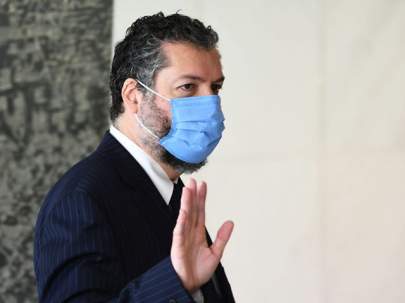Brazil’s Top Diplomat Quits Under Pressure from China

Brazil’s Foreign Affairs Minister Ernesto Araújo resigned on Monday, shortly after accusing pro-China lawmakers of pressuring him into supporting granting compromised telecommunications company Huawei Brazil’s lucrative pending contract to build a 5G network.
Prior to his resignation, Araujo had developed a reputation for being one of President Jair Bolsonaro’s staunchest anti-communist officials and a particularly vocal opponent of China’s attempts to control Brazilian politics. While Bolsonaro ran a presidential campaign on limiting China’s attempts at “buying” Brazil, as president he has strengthened ties to Beijing through economic deals and visited Beijing personally to attract further Chinese investment in the country.
China’s “discomfort” with Araujo maintaining the policy line that Bolsonaro had campaigned on with regards to the communist power was “evident and frequently emerged in private conversations,” the Brazilian newspaper O Globo noted this week.
“I struggled from the beginning for the freedom and dignity of Brazil and the Brazilian people, for our sovereignty and greatness in all aspects,” Araújo’s resignation letter to Bolsonaro, which he posted to Twitter, read in part. “I tried — before many, many colleagues for whom ‘diplomat’ and ‘patriot’ are not antonyms — to place Itamaraty [the Brazilian Foreign Ministry] at the service of the dream of a new Brazil.”
Araújo went on to state that he had been facing increasingly “adversarial” forces that had created a situation in which “it is impossible for me to continue working for our ideals in the position that I currently occupy.” The top diplomat specifically mentioned accusations that his resistance to Chinese influence had hurt Brazil’s attempts to acquire vaccines from foreign countries and claimed them all to be “false and hypocritical.”
“Unfortunately, in this moment of national life, the truth doesn’t matter for the forces that want to return to power — that force that, during the decades it ruled, only brought Brazil backwardness, corruption, and disgrace,” Araújo said, an apparent reference to the controversial release of former socialist President Luiz Inácio Lula da Silva from prison despite multiple convictions on extensive corruption charges.
“The truth liberates and lies enslave,” the letter continued. “Today, lies are shamelessly used for a materialistic project that seeks to enslave Brazil and Brazilians, and enslave the human being himself and rob him of his material and, primarily, spiritual dignity.”
The day before his resignation, Araújo published a message on Twitter accusing Senator Kátia Abreu of the left-wing Progressive party of pressuring him to allow Huawei, a Chinese telecommunications company, to build Brazil’s 5G network. Abreu runs the Brazilian Senate Foreign Relations Committee.
“On March 4 I had lunch with [Abreu],” Araújo wrote. “Short conversation. Little to nothing about vaccines. At the end, at the table, she says, ‘Minister, if you made a mode a move [sic] on 5G, you would be the king of the Senate.’ I made no move.”
Araújo did not mention Huawei, but Brazilian media assumed that, given his public opposition to allowing Huawei into Brazil due to its close ties with the Communist Party, Huawei was the company in question.
Abreu responded to the tweet with an extended statement referring to Araújo as an “outcast” and demanding his replacement for being “someone who insists on living outside good diplomacy, outside the truth of facts, outside balance and outside respect for institutions.”
Abreu reportedly admitted she defended Huawei as a contender to build the network despite the fact that Araújo’s statement did not mention the company.
Bolsonaro’s government is preparing to open bidding on a 5G contract this summer. In mid-March, Brazilian Communications Minister Fábio Faria admitted Huawei into the bidding process despite extensive national security concerns. A week before Huawei received approval for bidding, Faria ha stated that the company did not meet Brazil’s standards for such a large government contract. Faria visited Beijing shortly before the reversal.
Abreu was far from the only member of Congress pressuring Araújo to be more friendly to China. In its report noting China’s “discomfort” with the top diplomat, O Globo noted that the president of the Chamber of Deputies (roughly equivalent to the U.S. Speaker of the House) Arthur Lira met with a senior Chinese official last week for a conversation that the newspaper categorized as “mainly an attempt by Lira to occupy what he perceived to be a vacuum left by Araújo in the relationship with China.” Lira won the presidency of the lower house in part through an alliance with Bolsonaro against the further left forces in the lawmaking body.
O Globo reported following Araújo’s resignation that Bolsonaro was likely to choose someone more “pragmatic” that could “facilitate” ties with China following his former top diplomat’s departure, placing Brazilian Ambassador to Paris Luis Fernando Serra at the top of the list of possible replacements. Bolsonaro’s Washington envoy, Nestor Forster, is another option, though one O Globo suggested would find little support in Congress due to his proximity to Araújo and high likelihood of continuing the latter’s policies.
Photo: EVARISTO SA/AFP via Getty Images
Link: https://www.breitbart.com/latin-america/2021/03/30/brazils-top-diplomat-quits-pressure-china/











